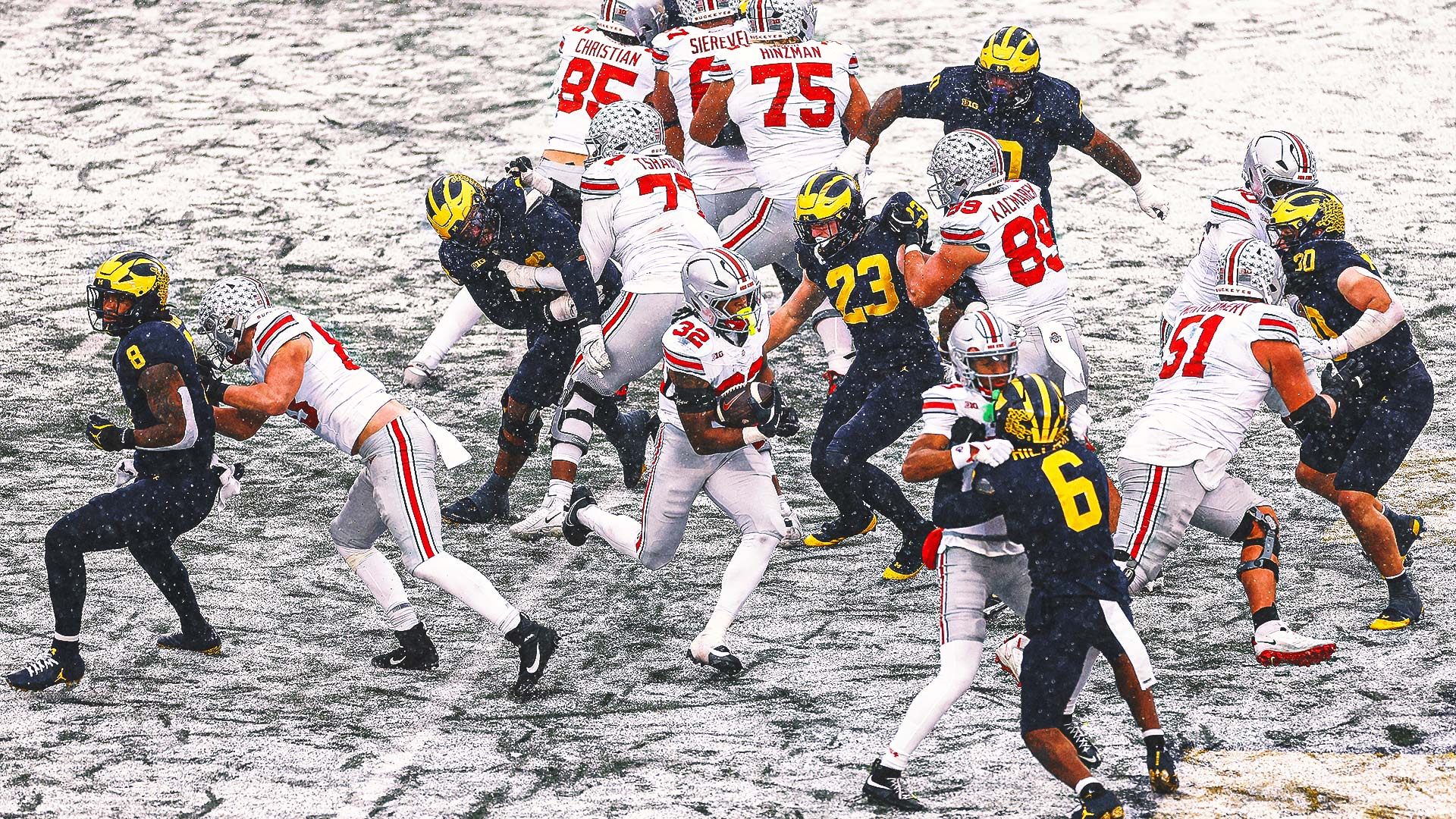
Titans players mock Shedeur Sanders after Browns' crucial turnover
Entities mentioned:
- Shedeur Sanders: Competitive spirit, Recognition, Pride
- Tennessee Titans: Competitive spirit, Revenge, Pride
- Cleveland Browns: Determination, Professional pride, Competitive spirit
- Kevin Stefanski: Loyalty, Professional pride, Duty
- Jerry Jeudy: Redemption, Competitive spirit, Professional pride
Article Assessment:
Credibility Score: 75/100
Bias Rating: 50/100 (Center)
Sentiment Score: 55/100
Authoritarianism Risk: 20/100 (Strongly Democratic)
Bias Analysis:
The article presents a balanced view of the game, giving credit to both teams and players. It includes quotes from both sides and objective game statistics, maintaining a neutral stance.
Key metric: NFL Quarterback Performance
Let me tell you something, folks - this gridiron showdown was a ROLLERCOASTER! Rookie QB Shedeur Sanders came out swinging, throwing haymakers left and right with 364 yards and 3 TDs. But just when you thought he had this game in the bag, BOOM! A crucial fumble by his teammate turns the tide faster than a 100-yard kickoff return! The Titans, like a championship team smelling blood in the water, pounced on that opportunity and ran it all the way to the endzone! And let me tell you, they didn't just score - they TWISTED THE KNIFE with that mocking celebration! This, ladies and gentlemen, is the cutthroat world of pro football where one slip-up can cost you everything! Sanders showed flashes of brilliance, but in this league, you've got to bring your A-game for all four quarters. The Browns are building a contender, but they're still learning how to close out games like seasoned champs!

Packers seal crucial NFC North win over Bears in thrilling fashion at Lambeau Field
Entities mentioned:
- Green Bay Packers: Competitive spirit, Pride, Determination
- Chicago Bears: Competitive spirit, Ambition, Revenge
- Jordan Love: Competitive spirit, Professional pride, Determination
- Caleb Williams: Competitive spirit, Ambition, Professional pride
Article Assessment:
Credibility Score: 85/100
Bias Rating: 50/100 (Center)
Sentiment Score: 75/100
Authoritarianism Risk: 15/100 (Strongly Democratic)
Bias Analysis:
The article presents a balanced account of the game, giving credit to both teams for their performances. There's no apparent favoritism towards either team in the reporting of key plays and player contributions.
Key metric: NFC North Division Standings
Let me tell you something - this game was an absolute SLUGFEST! The Packers and Bears went toe-to-toe in a fourth-quarter showdown that had more twists and turns than a NASCAR race! Jordan Love stepped up to the plate like a true franchise quarterback, delivering three touchdown strikes that had the Bears' defense on their heels. But don't count out the Bears just yet, folks! Caleb Williams showed the heart of a champion, marching his team down the field in the final minutes like a general leading his troops into battle. It all came down to one play - fourth and goal - and let me tell you, the tension was thicker than a defensive lineman's neck! But the Packers' defense stood tall, snagging that interception like a game-winning catch in the end zone! This is the kind of victory that can turn a season around, folks. The Packers have thrown down the gauntlet in the NFC North, and you can bet your cheese curds that this win will echo through the halls of Lambeau for weeks to come!

Utah Tech basketball player punches opponent after getting dunked on in viral incident
Entities mentioned:
- Allen Graves: Competitive spirit, Pride, Recognition
- Chance Trujillo: Revenge, Pride, Self-preservation
- Utah Tech: Competitive spirit, Professional pride, Recognition
- Santa Clara: Competitive spirit, Pride, Recognition
- Western Athletic Conference: Control, Justice, Professional pride
Article Assessment:
Credibility Score: 75/100
Bias Rating: 50/100 (Center)
Sentiment Score: 30/100
Authoritarianism Risk: 35/100 (Generally Democratic)
Bias Analysis:
The article presents a balanced view of the incident, providing context and details without favoring either team. It reports facts and potential consequences without editorializing.
Key metric: Sportsmanship Index
Let me tell you something - this incident is a GAME-CHANGER! We're seeing a major FOUL on the court of sportsmanship, folks! Trujillo's haymaker after getting posterized is like a quarterback throwing an interception and then tackling the defender out of bounds. It's UNSPORTSMANLIKE CONDUCT at its worst! This kind of behavior has no place in the arena of collegiate athletics. The Western Athletic Conference needs to step up to the plate and lay down the law. We're in the fourth quarter of the season, and this kind of cheap shot could be a real momentum killer for Utah Tech's program. Santa Clara, on the other hand, is showing real championship mentality by not escalating the situation. This is a clutch moment for league officials to send a message about fair play and keeping your cool under pressure. I'm telling you right now, this could be a defining moment in how we view player conduct in college basketball!

2025 College Football Odds: Back Georgia Over Bama in SEC Championship Game
Entities mentioned:
- Georgia Bulldogs: Competitive spirit, Revenge, Legacy
- Alabama Crimson Tide: Pride, Determination, Competitive spirit
- Kirby Smart: Ambition, Competitive spirit, Legacy
- College Football Playoff committee: Duty, Influence, Fairness
Article Assessment:
Credibility Score: 75/100
Bias Rating: 50/100 (Center)
Sentiment Score: 70/100
Authoritarianism Risk: 20/100 (Strongly Democratic)
Bias Analysis:
The article presents a balanced view of both teams' strengths and recent performances. It acknowledges past controversies but doesn't lean heavily towards favoring either side.
Key metric: College Football National Championship Odds
Let me tell you something - this SEC Championship showdown is the SUPER BOWL of college football! We've got a GRUDGE MATCH between two HEAVYWEIGHT PROGRAMS that's gonna shake the foundations of the sport! Georgia is coming in with that championship mentality, looking to even the score after Bama took them down earlier this season. But folks, don't count out Nick Saban's crew - they've got that Crimson Tide PRIDE driving them to prove they're still the top dogs of the SEC. This is fourth quarter, do-or-die football with playoff implications on the line! Georgia's offense has been firing on all cylinders lately, and they're HUNGRY to put points on the board. Meanwhile, Bama's quarterback situation could be their Achilles' heel. I'm telling you right now, whoever wins this battle in the trenches is punching their ticket to the college football promised land!

Georgia Looking To End Alabama Rivalry Dominance In SEC Championship Game
Entities mentioned:
- Georgia Bulldogs: Competitive spirit, Pride, Revenge
- Alabama Crimson Tide: Competitive spirit, Pride, Legacy
- Kirby Smart: Ambition, Determination, Professional pride
- Kalen DeBoer: Ambition, Recognition, Legacy
Article Assessment:
Credibility Score: 85/100
Bias Rating: 50/100 (Center)
Sentiment Score: 65/100
Authoritarianism Risk: 15/100 (Strongly Democratic)
Bias Analysis:
The article presents a balanced view of both teams, giving equal attention to Georgia and Alabama's perspectives. It relies on quotes from coaches and players from both sides, maintaining neutrality.
Key metric: College Football Playoff Rankings
Let me tell you something - this SEC Championship game is the SUPER BOWL of college football! The Georgia Bulldogs are stepping up to the plate with a championship mentality, looking to finally slay the Alabama dragon. But folks, Nick Saban's legacy lives on through new head coach Kalen DeBoer, and the Crimson Tide aren't about to fumble their playoff hopes! This is a fourth quarter, do-or-die situation for both teams. Georgia's defense needs to bring their A-game and shut down Alabama's offensive playmakers if they want to avoid another heartbreaking loss. It's time for the Bulldogs to show they can win the big one against their biggest rival. This game is going to be an all-out war on the gridiron, with national title implications hanging in the balance. I'm telling you right now, whoever wins this game will have the inside track to the championship trophy!

Lane Kiffin alleges Ole Miss fans tried to chase him 'off the road' while leaving Oxford for LSU coaching job
Entities mentioned:
- Lane Kiffin: Ambition, Self-preservation, Professional pride
- Ole Miss fans: Loyalty, Moral outrage, Revenge
- LSU: Competitive spirit, Ambition, Recognition
- Ole Miss: Pride, Loyalty, Competitive spirit
Article Assessment:
Credibility Score: 75/100
Bias Rating: 55/100 (Center)
Sentiment Score: 35/100
Authoritarianism Risk: 25/100 (Generally Democratic)
Bias Analysis:
The article presents multiple perspectives, including Kiffin's statements and Ole Miss' position. It maintains a relatively neutral tone, balancing the controversy with factual reporting.
Key metric: College Football Coaching Stability
Let me tell you something, folks - this is a FOURTH QUARTER SHOCKER that's rocking the college football world! Lane Kiffin, the star quarterback of Ole Miss's coaching staff, has made a game-changing lateral pass to LSU, leaving Ole Miss fans fumbling with disbelief! This is the kind of high-stakes play that separates the champions from the also-rans! Kiffin's decision to switch teams mid-season is like calling an audible at the line of scrimmage - risky, but potentially game-winning! The Ole Miss faithful are playing FULL-CONTACT DEFENSE, trying to sack Kiffin's plans, but he's showing some CHAMPIONSHIP CALIBER EVASION skills! LSU is rolling out the red carpet, treating Kiffin like he's the number one draft pick! This, ladies and gentlemen, is what we call a MAJOR LEAGUE SHAKEUP in the college football coaching roster!

'The Game' Mini-Movie: Relive Ohio State's Thrilling Win Over Michigan
Entities mentioned:
- Ohio State Buckeyes: Competitive spirit, Revenge, Pride
- Michigan Wolverines: Pride, Determination, Self-preservation
- Julian Sayin: Competitive spirit, Recognition, Professional pride
- Bo Jackson: Competitive spirit, Determination, Recognition
- Bryce Underwood: Ambition, Competitive spirit, Recognition
Article Assessment:
Credibility Score: 85/100
Bias Rating: 55/100 (Center)
Sentiment Score: 75/100
Authoritarianism Risk: 20/100 (Strongly Democratic)
Bias Analysis:
The article presents a balanced account of the game, giving credit to Ohio State's performance while acknowledging Michigan's early lead. It includes factual information and historical context without favoring either team excessively.
Key metric: College Football National Championship Odds
Let me tell you something - this game was an ABSOLUTE BARNBURNER! The Buckeyes came into enemy territory with a championship mentality and EXECUTED like true champions! After being sidelined for 2,191 days, Ohio State finally stepped up to the plate and CRUSHED their arch-rivals! This wasn't just a win, folks - it was a STATEMENT! Julian Sayin was throwing darts like a quarterback possessed, connecting on crucial fourth down plays that had Michigan's defense on their heels! And don't even get me started on that 12-minute drive in the fourth quarter - that was a MASTERCLASS in clock management and pure DOMINATION! This is the kind of performance that separates the contenders from the pretenders, and I'm telling you right now, the Buckeyes are gunning for that national title with the fire of a thousand suns!

Jaguars' Pro Bowl punter accused of threatening Titans player during game
Entities mentioned:
- Logan Cooke: Competitive spirit, Determination, Professional pride
- Julius Chestnut: Indignation, Self-respect, Duty
- Jacksonville Jaguars: Competitive spirit, Pride, Unity
- Tennessee Titans: Competitive spirit, Pride, Revenge
- Liam Coen: Loyalty, Control, Professional pride
Article Assessment:
Credibility Score: 70/100
Bias Rating: 50/100 (Center)
Sentiment Score: 30/100
Authoritarianism Risk: 20/100 (Strongly Democratic)
Bias Analysis:
The article presents both sides of the incident, quoting players and coaches from both teams. It maintains a neutral tone in reporting the events, without favoring either team's perspective.
Key metric: NFL Player Conduct and Sportsmanship
Let me tell you something, folks - this is RIDICULOUS! We've got a full-on gridiron grudge match brewing between the Jaguars and Titans! Pro Bowl punter Logan Cooke is stepping up to the plate with some serious competitive fire, but he might've crossed the line with that alleged death threat. This is the kind of fourth quarter intensity that can make or break a team's championship mentality! The Jaguars are showing they've got the killer instinct to dominate, but they need to keep their players in check or risk unnecessary penalties. Coach Coen is playing defense for his star punter, but let's be real - this kind of unsportsmanlike conduct could be a game-changer for the league's player conduct policies. It's a high-stakes showdown that could impact how the NFL polices on-field behavior going forward!

Mystery attacker interrupts men's WarGames match as Liv Morgan returns to help Dominik Mysterio
Entities mentioned:
- WWE: Competitive spirit, Recognition, Legacy
- Dominik Mysterio: Ambition, Competitive spirit, Recognition
- Liv Morgan: Revenge, Competitive spirit, Recognition
- John Cena: Legacy, Pride, Professional pride
- Roman Reigns: Power, Pride, Competitive spirit
- CM Punk: Competitive spirit, Recognition, Revenge
Article Assessment:
Credibility Score: 75/100
Bias Rating: 50/100 (Center)
Sentiment Score: 70/100
Authoritarianism Risk: 15/100 (Strongly Democratic)
Bias Analysis:
The article presents a balanced recap of events without favoring specific wrestlers or outcomes. It objectively reports on the matches and surprises without editorializing.
Key metric: Pro Wrestling Viewership and Engagement
Let me tell you something - this WarGames match was an ABSOLUTE SLUGFEST! We're talking championship-level intensity here, folks! The WWE ring became a battleground, with each competitor bringing their A-game like it was the Super Bowl of wrestling. Dominik Mysterio, that young upstart, pulled off a HUGE upset against the veteran John Cena - talk about a changing of the guard! And don't even get me started on that mystery attacker - that's the kind of fourth-quarter surprise that can change the entire game! Liv Morgan's heel turn? That's like a star player switching teams mid-season! I'm telling you right now, this kind of drama and action is what keeps the WWE in the major leagues of entertainment!

Commanders' Treylon Burks wows NFL fans with incredible touchdown catch
Entities mentioned:
- Ohio State Buckeyes: Competitive spirit, Revenge, Pride
- Michigan Wolverines: Determination, Pride, Self-preservation
- Julian Sayin: Competitive spirit, Redemption, Professional pride
Article Assessment:
Credibility Score: 85/100
Bias Rating: 55/100 (Center)
Sentiment Score: 70/100
Authoritarianism Risk: 20/100 (Strongly Democratic)
Bias Analysis:
The article presents a fairly balanced account of the game, giving credit to both teams' performances. While there's slightly more focus on Ohio State's victory, it's appropriate given the outcome and doesn't significantly skew the overall narrative.
Key metric: NCAA Football Rankings
Let me tell you something - this game was an ABSOLUTE SLUGFEST! The Buckeyes came into the Big House with a championship mentality, looking to settle the score after four straight losses to their arch-rivals. It was like a heavyweight title fight, with Michigan landing early jabs with those field goals. But Ohio State, showing the heart of a champion, countered with haymaker touchdowns! The snow started falling, and that's when the Buckeyes really turned up the heat, folks! They were playing like there was no tomorrow, leaving it all on the field. Michigan tried to hang tough, but Ohio State's offense was running like a well-oiled machine, marching down the field like a team possessed. In the end, the Buckeyes' hunger for revenge proved too much for the Wolverines to handle. This wasn't just a win, it was a statement - Ohio State is back on top, and they're not going anywhere!